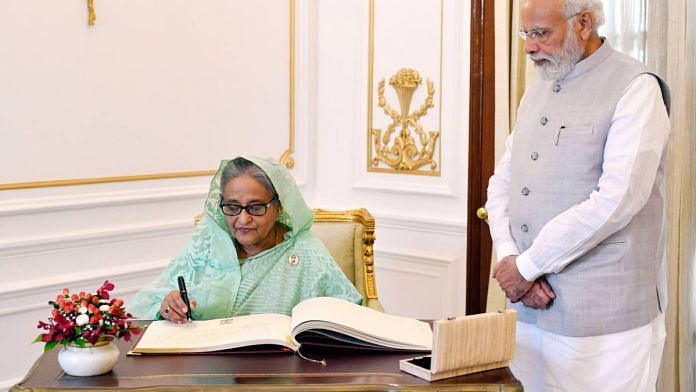New Delhi: For the first time in 26 years, India and Bangladesh Tuesday signed a treaty to share the water of a key transboundary river, Kushiyara, while the long-pending pact to share the waters of Teesta River — a politically-sensitive issue for Bangladesh Prime Minister Sheikh Hasina — continued to remain stuck.
“India is the most important and closest neighbour for Bangladesh. Bangladesh-India bilateral relations are known to be a role-model for neighbourhood diplomacy,” Hasina said in her press statement during a bilateral summit with Prime Minister Narendra Modi in the Capital.
She added that India and Bangladesh have resolved many outstanding issues in the past in the “spirit of friendship and cooperation”. “We hope that all outstanding issues, including the Teesta water-sharing treaty, will be concluded at an early date,” Hasina said.
She lauded the signing of the Kushiyara treaty and said that when neighbours share a close relationship, they understand how to solve all issues with “dialogue and understanding”. Previously, the Ganga water treaty was signed between Bangladesh and India in 1996.
Hasina, who faces elections next year, said India is a “special place” for her and her family because it was India that gave her and her sister shelter when she was a “refugee living in exile for six years” (1975 to 1981).
PM Modi in his press statement said: “Today, we have signed an important agreement on water-sharing from the Kushiyara River. This will benefit Southern Assam in India and Sylhet region in Bangladesh.”
“There are 54 rivers that pass through the Indo-Bangladesh border, and have been linked to the livelihood of the people of both countries for centuries,” added Modi.
The plan to sign the river agreement was finalised last month when the India-Bangladesh joint river commission met in New Delhi after 12 years.
At that time, it was also agreed by both sides to expand cooperation to areas like addressing pollution in rivers. India has been sharing real-time flood data with Bangladesh, the period of which has now been extended, said sources.
However, sources added, Hasina will have to hard-sell the Kushiyara treaty back home as her constituency has been demanding the Teesta pact for several years now.
The Teesta deal was set to be signed during former PM Manmohan Singh’s visit to Bangladesh in September 2011 but was postponed at the last minute due to objections raised by West Bengal Chief Minister Mamata Banerjee, who is still opposed to sharing the waters of the river with Bangladesh.
The Teesta River flows through Sikkim and then enters West Bengal before finally merging with the Brahmaputra in Assam and the Jamuna in Bangladesh.
Also read: How Sheikh Hasina’s breaking the Chinese wall, creating new links between India — and India
‘India largest market for Bangladesh’
After his talks with PM Hasina, Modi said India is the largest market in Asia for Bangladeshi goods and that is why both countries will now have a Comprehensive Economic Partnership Agreement (CEPA).
“Today, India is the largest market in Asia for Bangladesh’s exports. To further accelerate this growth, we will soon start discussions on the bilateral Comprehensive Economic Partnership Agreement,” he said.
Modi also said: “Today, Bangladesh is India’s largest development partner and our largest trade partner in the region.”
According to foreign secretary Vinay Kwatra, the CEPA talks will begin soon. He added that for trade to take off in a big way, connectivity is key.
India has extended $9.5 billion to Bangladesh in concessional loans and is taking up several connectivity projects, which include supporting the Khulna-Darsana railway line project and the Parbatipur-Kaunia railway line project in Bangladesh.
Modi and Hasina Tuesday also virtually inaugurated the 1,320 MW (660×2 MW) Maitree super thermal power project at Rampal in Bangladesh’s Khulna and four other projects, including a rail bridge on Rupsa River and Khulna-Darsana and Parbatipur-Kaunia rail link projects.
Powering the India-Bangladesh partnership!
PM @narendramodi and PM Sheikh Hasina jointly unveiled Unit-I of the Maitree Super Thermal Power Project.
Being constructed under India’s concessional financing scheme, the Project will add 1320 MW to Bangladesh’s National Grid. pic.twitter.com/7eXXMOi6ny
— Arindam Bagchi (@MEAIndia) September 6, 2022
With the operationalisation of the Haldibari (India)-Chilahati (Bangladesh) rail link, five of six pre-1965 rail links have been revived between India and Bangladesh.
Other rail links that have been made operational between the nations include Petrapole (India)-Benapole (Bangladesh), Gede (India)-Darsana (Bangladesh), Singhabad (India)-Rohanpur (Bangladesh), and Radhikapur (India)-Birol (Bangladesh).
Both sides are also constructing the Akhaura-Agartala rail link, which is one of the key projects.
On 1 June, a third passenger train service — Mitali Express — from New Jalpaiguri in India to Dhaka was flagged off.
Modi, Hasina discuss Rohingya issue
During Tuesday’s summit, Bangladesh raised with India the issue of Rohingya refugees, as Dhaka has been pushing New Delhi to urge neighbouring Myanmar to take them back. Since 2017, Bangladesh has been consistently taking in refugees fleeing persecution in Myanmar on a large scale.
According to Kwatra, Bangladesh has gone out of its way to help the Rohingya refugees. He said India will do whatever it can to help Bangladesh in this matter. “India will continue to support their return in a safe, secure and expedited manner,” he said.
(Edited by Nida Fatima Siddiqui)
Also read: Why Bangladesh is absolutely quiet when it comes to anti-Prophet remarks by BJP leaders



